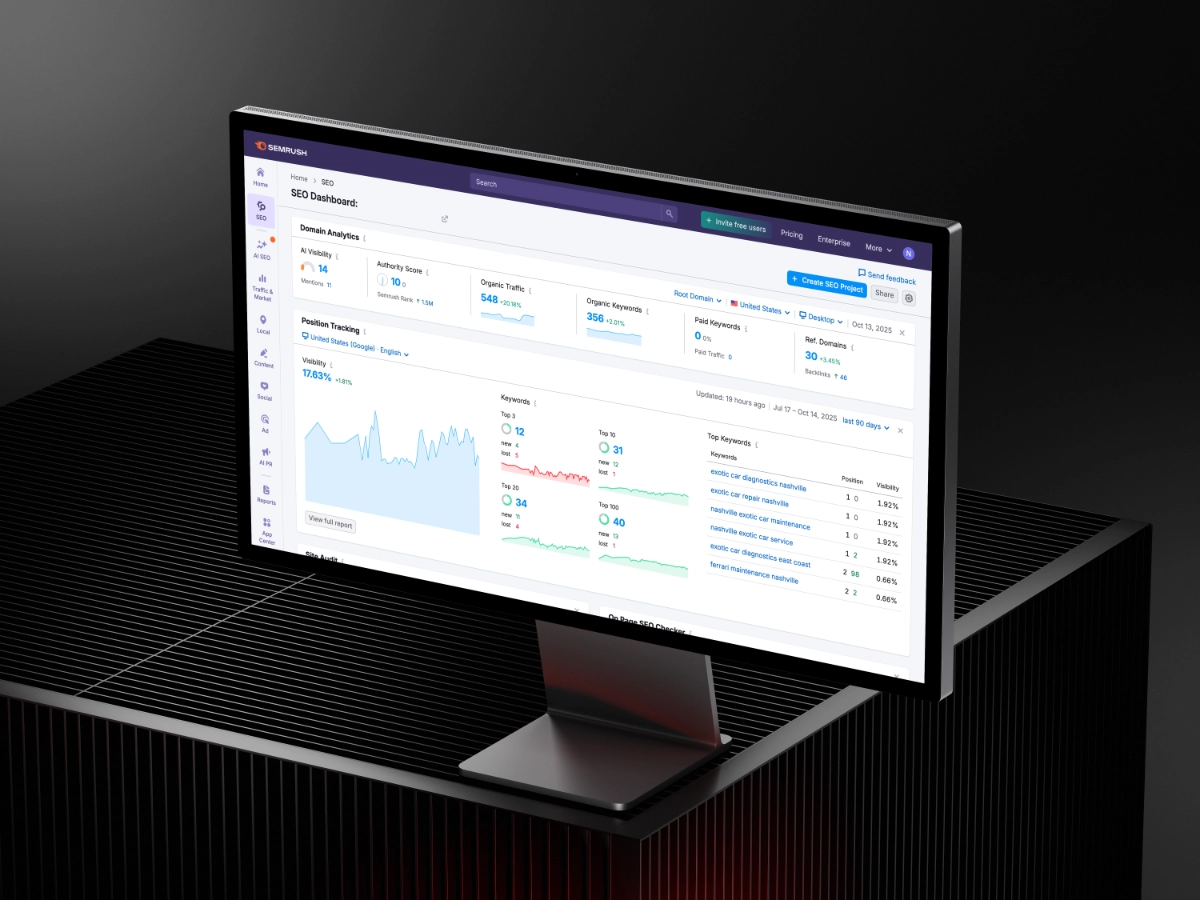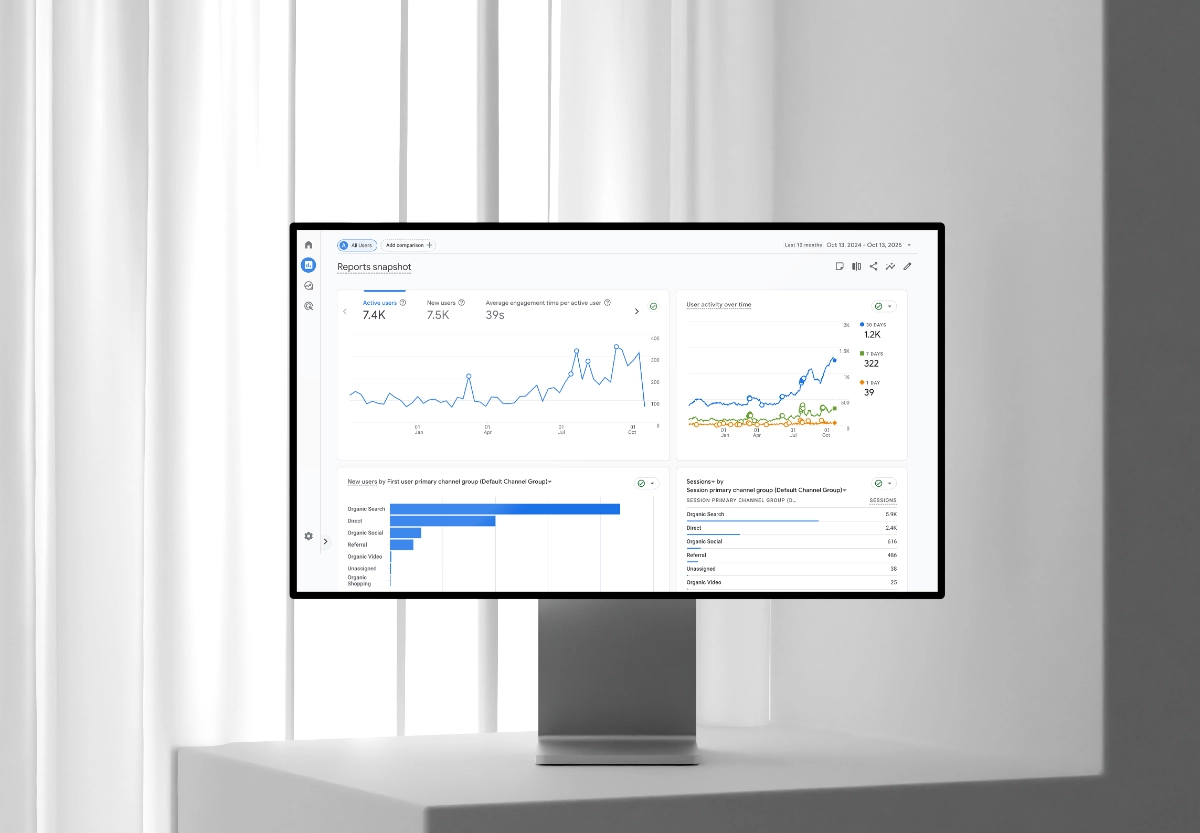How Auto Repair Shops Can Use SEO to Bring in More Local Customers
By Nicholas Reed
October 16, 2025

When someone's car breaks down or needs maintenance, they don't flip through the Yellow Pages anymore—they pull out their phone and search "auto repair near me" or "mechanic open now." If your auto repair shop isn't showing up in those critical moments, you're losing customers to competitors who understand the power of local search. As an auto repair SEO agency, we have the tools and experience to help you. Follow along and learn everything you need to know about SEO for your auto repair business.
The reality is stark: 97% of consumers search online for local businesses, and 46% of all Google searches have local intent. For auto repair shops, mastering local SEO isn't optional—it's essential for survival and growth in today's digital-first world.
This guide will show you exactly how to use auto repair SEO to dominate local search results and bring a steady stream of customers through your bay doors.
Why Local SEO Matters for Auto Repair Shops
Unlike national brands, auto repair shops serve a specific geographic area. Your ideal customer lives or works within a 5-15 mile radius of your location. Local SEO for auto repair ensures you appear when nearby drivers need your services most.
Consider the customer journey: A driver notices their check engine light, searches for solutions on their lunch break, and books an appointment that afternoon. If your shop appears at the top of search results with a strong Google Business Profile, positive reviews, and clear service information, you win that customer. If not, your competitor does.
The beauty of auto repair SEO is that it targets high-intent customers—people actively looking for services right now, not browsing casually. These searches convert at dramatically higher rates than almost any other marketing channel.
Google Business Profile: Your Most Powerful Local SEO Tool
Your Google Business Profile (formerly Google My Business) is the cornerstone of local SEO for mechanics. When someone searches for auto repair services, Google displays a map pack featuring three local businesses. Appearing in this coveted space can drive massive traffic to your shop.
Claiming and Optimizing Your Profile
If you haven't claimed your Google Business Profile, do it immediately at business.google.com. Once claimed, optimize every element:
Business name: Use your official business name consistently across all platforms. Don't stuff keywords like "Joe's Auto Repair Best Mechanic in Denver"—Google penalizes this.
Category selection: Choose "Auto repair shop" as your primary category. Add secondary categories like "Brake shop," "Oil change service," "Transmission shop," or other specialties you offer. These categories directly impact when you appear in search results.
Business description: Use your 750-character limit wisely. Explain what makes your shop unique, your years of experience, certifications, and the types of vehicles you service. Naturally incorporate keywords like "auto repair," "mechanic," and your service area.
Service area: Define the geographic regions you serve. Be specific but realistic—if you're in Austin, you likely serve surrounding neighborhoods, not the entire state of Texas.
Hours of operation: Keep these updated, including special hours for holidays. Nothing frustrates customers more than driving to a shop that's unexpectedly closed.
Photos: Upload high-quality images of your facility, service bays, staff, and completed work. Profiles with photos receive 42% more requests for directions and 35% more click-throughs to websites.
The Review Game: Your Secret Weapon
Online reviews are pure gold for auto repair shops. They build trust, influence rankings, and directly impact whether a potential customer chooses you over competitors.
Actively request reviews: After completing quality service, ask satisfied customers to leave a Google review. Make it easy by sending a direct link via text or email. Most happy customers will review if asked—they just need a reminder.
Respond to every review: Thank customers for positive reviews and address negative ones professionally. Your responses show potential customers that you care about service quality and handle problems constructively.
Review quantity and recency matter: Google favors businesses with regular, recent reviews. Aim for a steady stream rather than 50 reviews in one month and nothing for six months.
One auto repair SEO agency client increased monthly leads by 180% simply by implementing a systematic review collection process and optimizing their Google Business Profile. The shop now ranks #1 in local map results for their primary keywords.
Local Citations: Building Your Digital Footprint
Local citations are online mentions of your business name, address, and phone number (NAP). These citations tell Google your business is legitimate and help establish geographic relevance.
Core Citation Sources
Start with these essential directories:
- Yelp for Business
- Facebook Business Page
- Apple Maps
- BBB (Better Business Bureau)
- Yellow Pages
- RepairPal
- Angie's List / Angi
- Carfax Service Shop Directory
NAP consistency is critical: Your business name, address, and phone number must be identical across all citations. "Joe's Auto Repair" on one site and "Joe's Auto Repair Shop" on another creates confusion and weakens your local SEO signals.
Industry-Specific Citations
Don't overlook automotive-specific directories:
- AAA Approved Auto Repair
- Mechanic Advisor
- Openbay
- ASE (Automotive Service Excellence) shop locator
- Car Care Aware
These specialized citations carry extra weight because they're industry-relevant and frequented by people actively seeking auto repair services.
On-Page SEO for Your Auto Repair Website
Your website is your digital storefront. It needs to convince both search engines and potential customers that you're the right choice.
Service Pages: One Page Per Service
Create dedicated pages for each major service you offer:
- Oil change services
- Brake repair and replacement
- Transmission repair
- Engine diagnostics
- AC repair
- Tire services
- State inspections
Each page should include:
- Clear service description (300+ words)
- Pricing information (at least a range)
- Why customers should choose your shop for this service
- Related services
- Clear call-to-action (phone number, booking button)
- Local keywords naturally incorporated
For example, instead of a generic "Services" page listing everything, create "/brake-repair-austin-tx" that thoroughly covers brake services with local geographic modifiers.
Location Pages for Multiple Shops
If you operate multiple locations, create unique pages for each with:
- Specific address and embedded Google Map
- Location-specific phone number
- Unique content about that location
- Nearby landmarks or neighborhoods served
- Individual staff photos and bios
Never duplicate content across location pages—Google penalizes this heavily.
Content That Answers Customer Questions
Auto repair customers research problems before calling. Create blog content addressing common questions:
- "Why is my check engine light on?"
- "How often should I change my oil?"
- "Signs you need new brakes"
- "Cost of transmission repair in [your city]"
- "How to choose a reliable mechanic"
This SEO for mechanics strategy captures people early in their research phase, building trust before they're ready to book service.
Technical SEO Essentials
While technical SEO might sound complex, these fundamentals are manageable:
Mobile optimization: Over 60% of local searches happen on mobile devices. Your website must load quickly and function perfectly on smartphones. Google penalizes sites with poor mobile experience.
Page speed: Slow websites lose customers and rankings. Compress images, minimize code, and use a quality hosting provider. Aim for load times under 3 seconds.
Schema markup: Add LocalBusiness schema to your website's code. This structured data tells Google exactly what services you offer, your hours, and location information, potentially earning enhanced search listings.
SSL certificate: Ensure your site uses HTTPS (secure connection). This is a Google ranking factor and builds customer trust when they submit contact information.
Local Link Building Strategies
Backlinks from other local websites signal relevance and authority to Google. For auto repair shops, focus on:
Local partnerships: Partner with related businesses like car dealerships, body shops, towing companies, and car washes. Exchange links or get featured on their resource pages.
Community involvement: Sponsor local sports teams, participate in community events, or support local charities. These activities often earn links from local news sites and organization websites.
Local media coverage: Pitch stories to local newspapers, radio stations, and blogs. "Local shop celebrates 25 years" or "Mechanic offers free car checks for seniors" can earn valuable local links.
Chamber of Commerce: Join your local chamber for networking and a valuable directory link.
Creating a Consistent Content Strategy
SEO isn't a one-time project—it requires ongoing effort. Develop a manageable content rhythm:
Monthly blog posts: Share seasonal maintenance tips, explain common problems, or highlight customer success stories.
Weekly social media: Post photos of your team, before-and-after repairs, maintenance reminders, and special offers. Social signals indirectly support SEO efforts.
Quarterly profile audits: Review all your online listings to ensure information remains accurate and consistent.
Tracking Your Local SEO Success
Measure these key performance indicators:
Google Business Profile insights: Track views, clicks to website, calls, and direction requests. This shows how many people find you through local search.
Website analytics: Monitor organic traffic, especially from local searches. Set up Google Analytics to track phone calls and form submissions.
Keyword rankings: Track positions for terms like "auto repair [your city]," "mechanic near me," and specific services in your area.
Review metrics: Monitor review quantity, average rating, and response rate. These directly correlate with rankings and conversion rates.
Lead volume and quality: Ultimately, SEO should drive more phone calls, appointments, and customers. Track monthly leads and conversion rates.
When to Hire an Auto Repair SEO Agency
While many tactics are DIY-friendly, working with an auto repair SEO agency can accelerate results dramatically. Consider professional help if:
- You lack time to manage ongoing optimization
- You're not seeing results after 3-6 months of effort
- You face fierce competition in your market
- You want to expand to multiple locations
- Technical SEO feels overwhelming
A specialized agency brings expertise in local search algorithms, proven processes, and tools that deliver faster, more substantial results.
Common Auto Repair SEO Mistakes to Avoid
Ignoring negative reviews: Responding professionally to criticism demonstrates maturity and often salvages the relationship.
Keyword stuffing: Writing "best auto repair mechanic car fix engine" throughout your website looks spammy and hurts rankings. Write naturally for humans first.
Inconsistent NAP information: Using different phone numbers or address formats confuses Google and weakens your local presence.
Neglecting mobile users: A clunky mobile experience drives potential customers straight to competitors.
Setting and forgetting: SEO requires ongoing maintenance. Update content, earn new reviews, and refresh information regularly.
The Long-Term Payoff
Local SEO for auto repair shops isn't a quick fix—it's a long-term investment that compounds over time. While PPC ads stop generating leads the moment you stop paying, SEO continues delivering customers month after month, year after year.
One shop we work with invested six months in comprehensive auto repair SEO. They now rank in the top three for 47 local keywords, receive 200+ monthly calls from organic search, and have reduced their advertising costs by 65% while increasing revenue by 40%.
Take Action Today
Start with these immediate steps:
- Claim and fully optimize your Google Business Profile
- Audit your NAP consistency across all online listings
- Ask your last ten satisfied customers for Google reviews
- Create or update service pages on your website with local keywords
- Set a goal to publish one helpful blog post this month
Remember, your competitors are either investing in SEO or falling behind. Every week you delay is potential revenue lost to shops that understand how local search works.
Auto repair SEO isn't rocket science, but it does require consistent effort and the right strategy. Whether you tackle it yourself or partner with professionals, the shops that dominate local search will dominate their markets in the years ahead.
The question isn't whether you can afford to invest in local SEO—it's whether you can afford not to.
Have a question about this resource?
Please take a moment to fill out our form and we will help you out as soon as possible!
Thank you! Your submission has been received!
Oops! Something went wrong while submitting the form.













